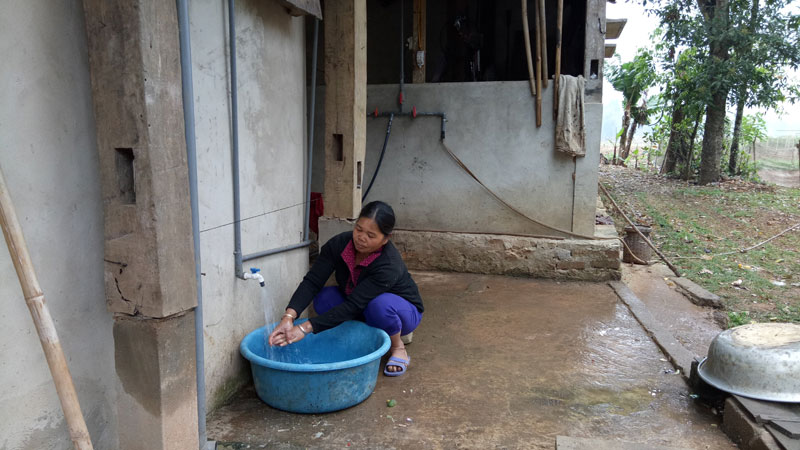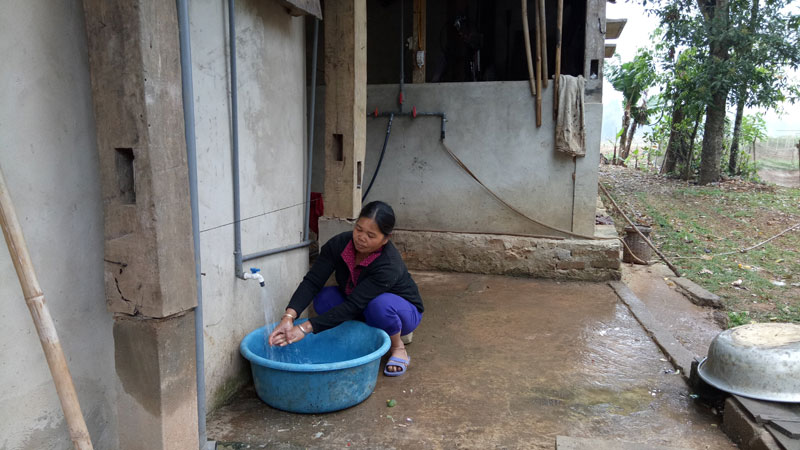
(HBO) – Over the past years, the northern province of Hoa Binh has effectively carried out the credit programme on clean water and environmental sanitation, contributing to improving local people’s living standards and rural environmental sanitation, and giving a facelift to rural areas.

Thanks to concessional loans from the Vietnam
Bank for Social Policies (VBSP), Ha Thi Kieu’s family in Cha hamlet, Tong Dau
commune, Mai Chau district, built a system of clean water and sanitation,
helping raise their living standards.
Vu Dinh Hoai, Director of the VBSP’s Hoa Binh
branch, said at the end of July, the province had 6,836 customers who took
loans worth more than 79.2 billion VND from the bank, increasing the total
outstanding balance to 389.9 billion VND owed by 35,709 households. Most of the
households have used the loans for right purposes.
Since the beginning of this year, the
households have built 6,863 clean water facilities and 6,836 sanitation
facilities such as water containers and filters, drilled wells, bathrooms and
toilets.
Thanks to such efforts, the rural environment
has been improved significantly, contributing to completing the environmental
criterion of new-style area building in hamlets and communes in the province.
The VBSP will continue to closely coordinate
with organisations and associations in localities to popularise credit policies
on clean water and rural environmental sanitation, creating conditions for
rural residents to approach preferential loans to build clean water and
sanitation facilities. At the same time, the bank will step up efforts to
collect debts and interest rates as scheduled to help other households access
loans.
Thanks to integrated loans, localities in the
province built hundreds of centralised clean water facilities. Up to 90 percent
of rural residents get access to clean water and over 70 percent of rural
households have hygienic toilets. Meanwhile, more than 60 percent of breeding
facilities meet sanitation requirements.
At the end of 2017, 79 out of the 191
communes in the province fulfilled the environment-related criterion in
new-style rural area building.
The emulation movement "Hoa Binh joining hands to build new-style rural areas” has been widely spreading, becoming a driving force that motivates the localities to renew rural landscapes and improve the material and spiritual lives of the residents. In this movement, the people play a central role-both as the main implementers and direct beneficiaries of its outcomes.
In response to the global digital revolution, Hoa Binh Newspaper is transforming itself into a modern and multi-platform media hub, blending cutting-edge technology with a restructured newsroom and a new generation of tech-savvy journalists.
Hoa Binh province’s Association of the Elderly recently held a conference to review the project on expanding the inter-generation self-help club model until 2025.
In a move to implement Resolution No. 57-NQ/TW, issued on December 22, 2024 by the Politburo, which targets breakthroughs in science-technology development, innovation, and digital transformation, the Hoa Binh provincial Department of Health has issued a plan to roll out the "Digital Literacy for All” campaign within the local health sector.
An Nghia Commune (Lạc Sơn District) is one of the communes that achieved the tha standard of the national new rural area in 2018. Entering a new development phase, the commune is now trying to meet the criteria for the advanced new rural development. With the strong political will and the public consensus, the commune is gradually overcoming the challenges to reach this goal, aiming for the sustainable development.



